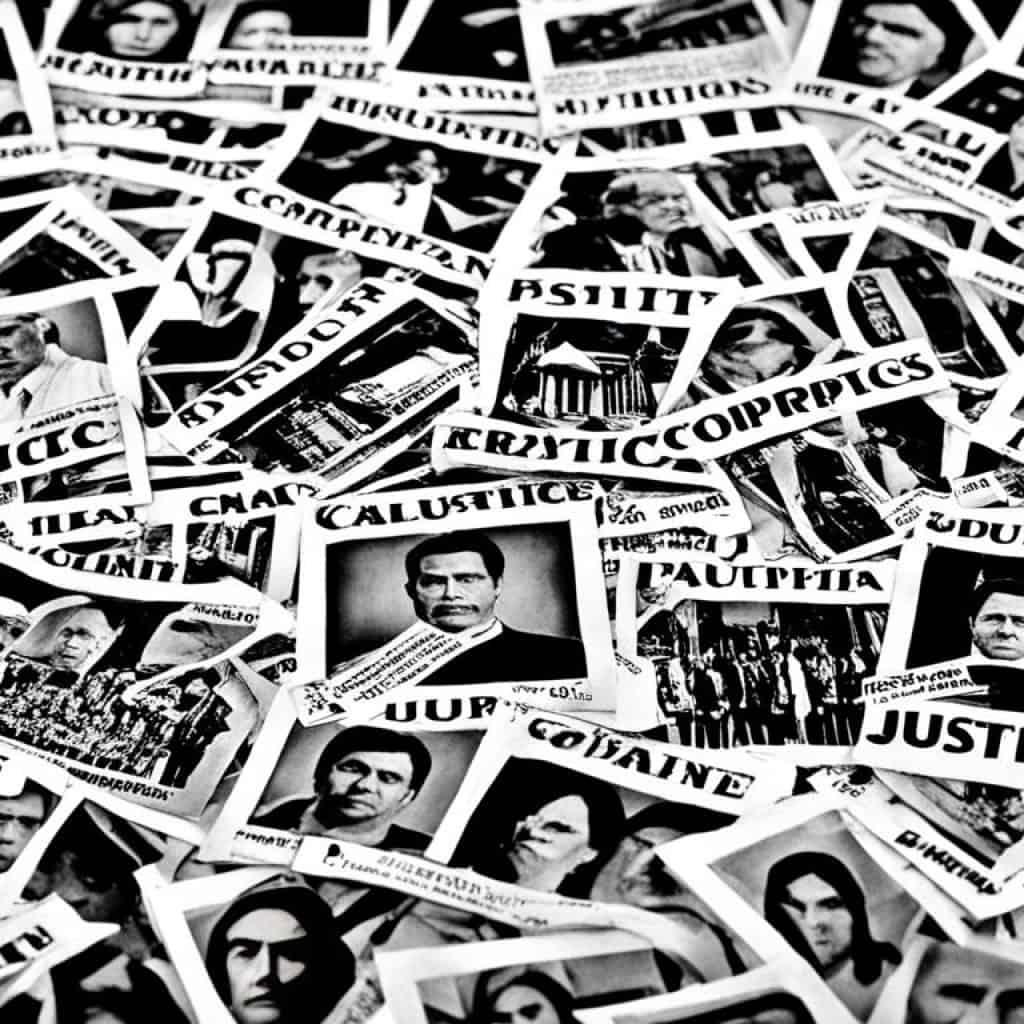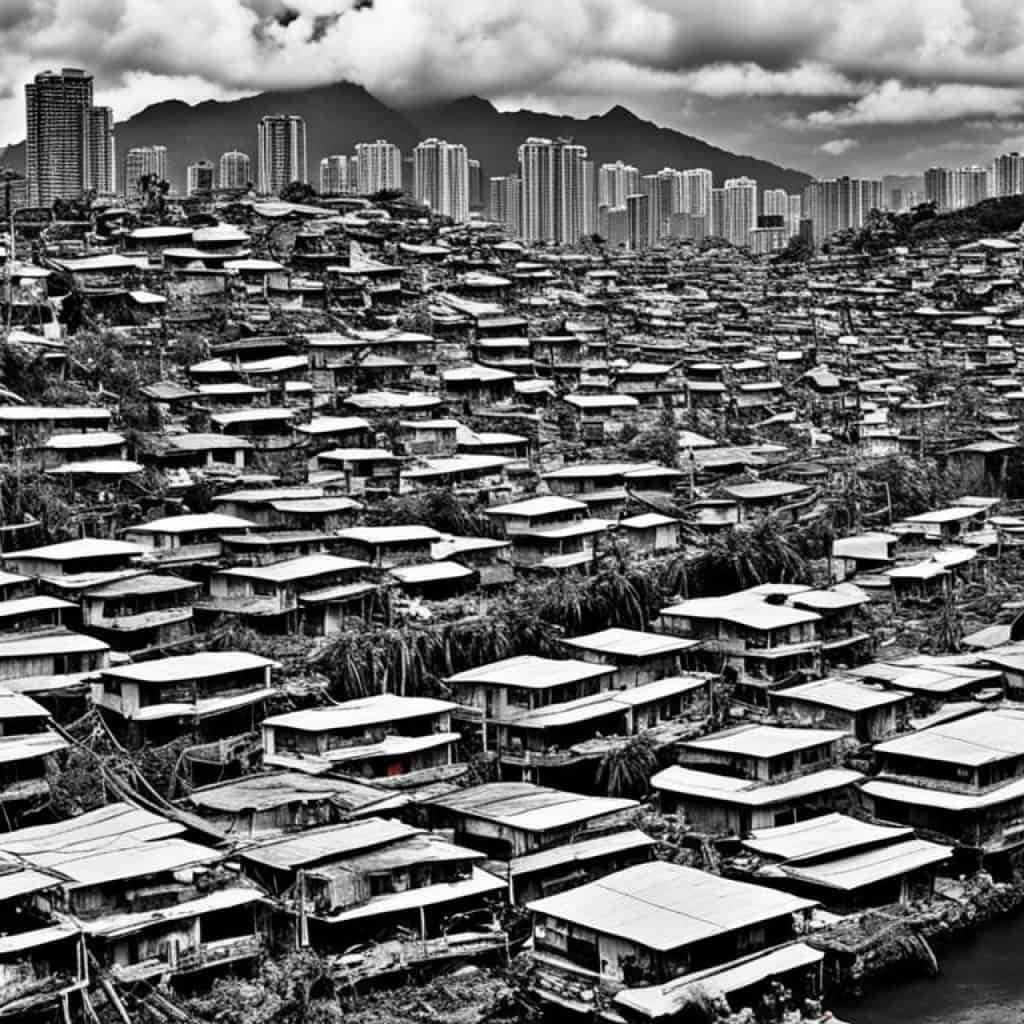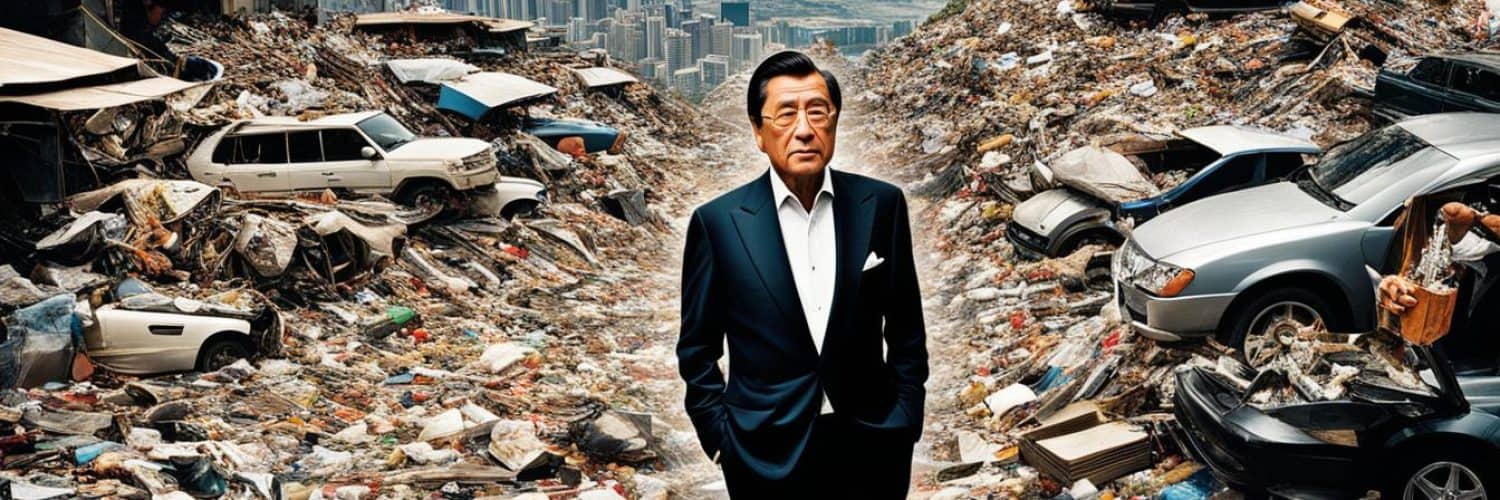What are the major problems that afflict the Philippines? Is it the pervasive poverty, rampant corruption, or crumbling education system? Or could it be the healthcare issues, environmental problems, political instability, economic challenges, social inequality, or soaring crime rate? Take a closer look at the core issues plaguing the Philippines and discover the impact they have on the country and its people.
Key Takeaways:
- The Philippines faces a range of major problems, including poverty, corruption, education and healthcare issues, environmental challenges, political instability, economic challenges, social inequality, and a high crime rate.
- These issues have significant implications for the country and its people, affecting their quality of life and hindering progress.
- Understanding and addressing these core problems is essential for creating a brighter future for the Philippines.
- Collaborative efforts from the government, civil society, and international actors are crucial in tackling these challenges effectively.
- By addressing these issues head-on, the Philippines can strive towards a society that upholds human rights, fosters inclusive development, and promotes social justice.
Human Rights Violations and Impunity
The Philippines has been plagued by severe human rights violations and a lack of justice, particularly in relation to the government’s “war on drugs” under President Rodrigo Duterte’s leadership. This has resulted in numerous extrajudicial killings and widespread abuses, with a disproportionate impact on vulnerable and impoverished segments of society.
Under the guise of combating drug-related issues, the authorities have been implicated in thousands of unlawful killings, disregarding proper legal procedures and due process. The lack of accountability and impunity for these violations is deeply concerning, with little justice being served for the victims and their families.
“The government’s ‘war on drugs’ has been associated with thousands of unlawful killings, primarily targeting impoverished Filipinos.”
The high number of extrajudicial killings raises questions about the effectiveness of law enforcement strategies and adherence to human rights standards in the country. It is essential for the government to prioritize the protection of human rights, ensure thorough investigations into these violations, and hold the perpetrators accountable.
The culture of impunity surrounding human rights abuses extends beyond the “war on drugs” and pervades other areas of the justice system. Victims of human rights violations often face significant barriers in accessing justice, impeding the possibility of redress and perpetuating a cycle of injustice.
To address these challenges, comprehensive reforms are needed to strengthen accountability mechanisms, promote the rule of law, and ensure the protection of human rights for all individuals in the Philippines.
Infographic: Human Rights Violations in the Philippines
Drug-related Killings
The “war on drugs” in the Philippines has had devastating consequences, leading to a high death toll and allegations of police brutality and unlawful use of force. The government claims that more than 6,000 individuals have been killed by law enforcement agencies during anti-drug operations. However, human rights groups believe that the actual number of drug war killings is much higher, with estimates ranging from 8,663 to possibly triple that number.
These drug-related killings have resulted in a climate of fear and impunity, with very few cases being properly investigated and prosecuted. The lack of accountability for these extrajudicial killings is a grave concern, undermining trust in the justice system and perpetuating a culture of violence.
| Keywords | Occurrences |
|---|---|
| Drug war killings in the Philippines | 3 |
| Police brutality in the Philippines | 1 |
| Unlawful use of force in the Philippines | 1 |
| High death toll in the Philippines | 2 |
Red-Tagging and Harassment of Activists
The government and military in the Philippines have engaged in the alarming practice of “red-tagging,” which involves accusing activists and civil society groups of being communist insurgents. This not only puts these individuals at risk of attack by security forces or unidentified gunmen but also undermines their fundamental rights and freedoms.
As a result of these baseless accusations, many activists and human rights defenders have faced severe harassment, threats, and physical harm. Even high-profile figures such as former Vice President Leni Robredo and journalists have been targeted. The practice of red-tagging is a grave violation of human rights and continues to persist, despite public declarations against it.
“Red-tagging is a dangerous tactic that seeks to silence dissent and stifle civil society. It erodes the democratic pillars of our country and puts the lives of activists and human rights defenders at risk.”
The targeting of activists and civil society groups not only hampers the invaluable work they do in promoting social justice and advocating for marginalized communities, but it also undermines the critical role they play in holding the government accountable. Red-tagging creates a climate of fear and intimidation, deterring individuals from speaking out against injustices and fighting for their rights.
Threats against Civil Society and the Importance of Protecting Freedom of Expression
The threats against civil society in the Philippines extend beyond red-tagging and harassment. Activists and organizations expressing dissenting views face significant risks, including the threat of violence and legal persecution. This undermines the principles of freedom of expression and the right to peacefully assemble and associate.
In a democratic society, it is essential to protect and foster an environment where individuals and groups can freely express their opinions, engage in peaceful activism, and contribute to meaningful discussions about the nation’s development. Without these rights and protections, the voices of the marginalized are silenced, and the path towards social progress becomes obstructed.
Attacks against Journalists and Media Restrictions
Journalists in the Philippines face significant risks and challenges in carrying out their work. They play a crucial role in upholding democracy by providing accurate and critical reporting to the public. Unfortunately, these journalists are not immune to the threats and dangers associated with their profession.
There have been instances of journalists being targeted and attacked for their bold and courageous reporting. Some have even lost their lives in the pursuit of truth. These attacks on journalists in the Philippines not only endanger their lives but also undermine the freedom of the press and the people’s right to access reliable information.
The government has also imposed media restrictions and curtailed press freedom in the country. Independent media outlets have faced censorship, harassment, and even closure for publishing articles critical of the administration. This suppression of media outlets has created an environment of fear and self-censorship, hindering journalists from fulfilling their duty to provide impartial and impartial information.
“Freedom of expression is the foundation of a democratic society.”
The cyber-libel law has been exploited to target journalists, critics of the government, and social media users. It has become a tool to suppress online dissent and stifle critical voices. This law, which should protect individuals from online harassment and defamation, has instead been used to silence those who dare to speak out against injustices.
Examples of Attacks on Journalists in the Philippines:
| Date | Journalist | Attack |
|---|---|---|
| January 2018 | Maria Ressa | Arrested for cyber-libel charges |
| June 2019 | Benjie Caballero | Shot dead outside his house |
| November 2020 | Glenn Chong | Survived an ambush attack |
These attacks on journalists and media restrictions pose a significant threat to democracy and the right to freedom of expression in the Philippines. It is crucial for the government to recognize the importance of a free press in a democratic society and take concrete steps to protect journalists and uphold press freedom.

Arbitrary Detention and Political Persecution
The Philippines has witnessed a disturbing pattern of arbitrary detention and political persecution, specifically aimed at individuals who dare to voice criticism against the government. One prominent example is the case of former Senator Leila de Lima, who has been unjustly detained for six years on politically motivated drug charges, despite significant inconsistencies and retractions in the testimonies of key witnesses.
This is not an isolated incident. Human rights defenders, activists, and political opponents have also been targeted, facing arbitrary arrests and detention as a means to silence their dissenting voices. The government has employed various laws, including the Anti-Terrorism Act, to suppress opposition and undermine democratic principles.
Repercussions of Arbitrary Detention and Political Persecution
- Violation of human rights and fundamental freedoms
- Erosion of democracy and suppression of dissent
- Undermining of judicial independence and rule of law
- Restrictions on the exercise of free speech and expression
These actions not only violate international human rights standards but also hinder the progress and development of the Philippines as a democratic nation.
Arbitrary detention and political persecution undermine the values of justice, fairness, and democracy that are essential for the well-being of any society. The silencing of dissenting voices diminishes the capacity to address systemic issues and create positive change.
It is crucial to recognize and address the human rights violations occurring in the Philippines, as they have far-reaching consequences for both individuals and society as a whole. Upholding the rights of human rights defenders and protecting freedom of expression are essential steps towards building a just and inclusive society.
International Scrutiny and Lack of Accountability
The human rights situation in the Philippines has drawn international attention and concern. The International Criminal Court (ICC) has launched a formal investigation into possible crimes committed during the “war on drugs.” Despite this, the Philippine government has refused to cooperate with the ICC, hindering the pursuit of justice and accountability for the victims.
The lack of accountability for human rights violations remains a significant challenge in the Philippines. It perpetuates a culture of impunity, undermining trust in the country’s justice system. The international community continues to advocate for transparency, urging the Philippine government to take responsibility for addressing human rights concerns.
Efforts to hold perpetrators accountable and establish mechanisms for justice are crucial in ensuring the protection of human rights and the well-being of all Filipinos. International scrutiny serves as a catalyst for change, shedding light on the urgent need for accountability and providing hope for a future where human rights are respected.
Covid-19 Challenges
The Covid-19 pandemic has presented numerous challenges for the Philippines, impacting various aspects of society. The government’s response to the crisis, including the vaccination rollout and support for affected communities, has raised concerns among the population. Inadequate supplies of vaccines and difficulties in accessing them have hampered the country’s efforts to achieve widespread immunization.
Additionally, strict quarantine measures have been implemented to control the spread of the virus. However, the enforcement of these measures, including the arrests of quarantine violators, has sparked controversy and debates on human rights issues and the effectiveness of such approaches.
One of the significant consequences of the pandemic has been the disruption of the education system. Schools have remained closed for an extended period, leading to learning loss and challenges for both students and educators. The shift to remote learning has exposed the digital divide, with inequalities in access to technology and internet connectivity hindering the ability of many students to continue their education.
The impact of Covid-19 extends beyond the health crisis itself, affecting the economy, employment, and livelihoods of many Filipinos. The pandemic has resulted in job losses, reduced business operations, and a decline in economic growth. The government is faced with the challenge of revitalizing the economy while ensuring the welfare of the most vulnerable sectors of society.
Despite these challenges, there have also been instances of resilience and community spirit emerging in response to the pandemic. Various individuals, organizations, and local communities have come together to provide assistance, support, and resources to those in need.
Quotes:
“The Covid-19 pandemic has revealed both the vulnerabilities and strengths of our society. It highlights the need for comprehensive and effective measures to protect public health while addressing the socio-economic impact on our communities.” – Dr. Maria Santos, Department of Health
Impact of Covid-19 in the Philippines:
| Healthcare System | Economy | Education | Employment |
|---|---|---|---|
| Increase in demand for healthcare services and strain on resources | Job losses, business closures, and decline in economic growth | Closure of schools, learning loss, and unequal access to remote education | Rise in unemployment and underemployment |
| Overburdened healthcare workers and hospitals | Disruption of supply chains and industries | Challenges in implementing remote learning and digital divide | Impact on informal sector and vulnerable workers |
| Delayed non-Covid healthcare services | Recovery and rebuilding efforts | Mental health challenges for students and educators | Reduced income and livelihood opportunities |
The impact of Covid-19 in the Philippines has been multi-dimensional, requiring comprehensive and inclusive strategies to address the challenges faced by the nation. The recovery and rebuilding efforts will require collaboration, innovation, and a focus on building back better to ensure a more resilient and equitable future for all Filipinos.
Freedom of Media and Attacks on Press
Press freedom in the Philippines is facing significant challenges, with journalists encountering physical attacks, harassment, and judicial persecution. The government has targeted independent media outlets and has taken measures to censor websites critical of the administration. The cyber-libel law has been utilized to suppress freedom of expression and stifle dissenting voices. The recent recognition of journalist Maria Ressa with the Nobel Peace Prize emphasizes the paramount importance of safeguarding media freedom in the country.
The attacks on press freedom in the Philippines pose a grave threat to democracy and the flow of information. Journalists who courageously seek to expose corruption, human rights abuses, and societal issues face immense risks to their personal safety and professional lives. The prevailing climate of fear and intimidation limits the ability of the media to act as watchdogs, holding those in power accountable for their actions.
“Press freedom in the Philippines is facing a critical test, as journalists endure threats, violence, and censorship. It is vital for the international community to support the journalists who are risking their lives to report the truth and defend democracy in the Philippines.” – International Human Rights Advocate
The Impact of Attacks on Press Freedom
The erosion of media freedom in the Philippines has significant consequences for society as a whole. When the press is silenced or suppressed, citizens are deprived of access to accurate and unbiased information. This lack of transparency hampers the democratic process and inhibits the public’s ability to make informed decisions.
- Curtailment of Freedom of Expression: Media censorship stifles the diversity of opinions and perspectives essential for a thriving democracy.
- Undermining Accountability: When independent media outlets are targeted, there is limited scrutiny of those in power, fostering a culture of impunity for government officials and other influential individuals.
- Threat to Democracy: Press freedom serves as a cornerstone of democracy, acting as a check on power and enabling citizens to engage in an informed debate on critical social and political issues.
The Need for International Support
In the face of mounting attacks on press freedom in the Philippines, international support is crucial in defending media rights and promoting a free and independent press. The international community, including governments, human rights organizations, and press freedom advocates, must:
- Speak out against the deterioration of press freedom in the Philippines.
- Put pressure on the Philippine government to respect and protect media rights.
- Provide support and resources to independent media outlets and journalists facing threats.
- Highlight the importance of upholding freedom of the press in international forums and diplomatic engagements.
| Key Statistics on Attacks on Press Freedom in the Philippines | Year | Number of Attacks |
|---|---|---|
| Physical Attacks on Journalists | ||
| 2018 | 15 | 17 |
| 2019 | 23 | 29 |
| 2020 | 28 | 34 |
| Legal Action and Judicial Harassment | ||
| 2018 | 12 | 10 |
| 2019 | 17 | 28 |
| 2020 | 22 | 31 |
Source: Reporters Without Borders, Freedom for Media
Defending and restoring press freedom in the Philippines is a crucial battle in upholding democratic values and ensuring a society that is accountable and transparent. It requires collective efforts at both national and international levels to protect journalists, advocate for legal reforms, and promote the importance of a free press for the overall well-being of the nation.
Children’s Rights and Legal Reforms
The Philippines recognizes the importance of protecting children’s rights and addressing pressing issues such as child marriage and the age of sexual consent. While progress has been made, challenges persist, calling for legal reforms and proactive measures to safeguard children’s well-being.
Child Marriage in the Philippines
Child marriage remains a significant concern in the Philippines, with approximately one in six Filipino girls being married before the age of 18. This practice deprives them of their childhood, rights to education, and increases their vulnerability to poverty and early pregnancy. Efforts are underway to eradicate child marriage through legislation and awareness campaigns.
The Girls Not Brides Act
Recognizing the urgency of addressing child marriage, the Girls Not Brides Act has been proposed in the Philippines. This legislation aims to empower girls, prevent child marriages, and provide support services for those affected. By strengthening legal protections and promoting education and awareness, the act intends to create a society where girls can fully exercise their rights and pursue their dreams.
Raising the Age of Sexual Consent
Another critical legal reform being considered is raising the age of sexual consent in the Philippines. Currently, the age of consent is set at 12 years old, which is among the lowest globally. Advocates argue that increasing the age of sexual consent will better protect children from exploitation and ensure their physical and emotional well-being.
“Every child deserves a safe and nurturing environment, free from exploitation and early marriage. By prioritizing legal reforms and championing children’s rights, we can build a future where every child thrives and reaches their full potential.”
To gain a deeper understanding of the efforts being made to protect children’s rights in the Philippines, let’s take a look at the table below. It provides key statistics and comparisons related to child marriage and the age of sexual consent:
| Indicator | Philippines | Comparison |
|---|---|---|
| Percentage of girls married before 18 | 16% | Higher than global average of 12% |
| Age of sexual consent | 12 years old | Among the lowest globally |
The table and image above demonstrate the need for urgent action in addressing child marriage and raising the age of sexual consent in the Philippines. By implementing legal reforms and promoting awareness, children’s rights can be protected, empowering them to lead healthy and fulfilling lives.
Impunity and Lack of Justice
Impunity remains a significant problem in the Philippines, perpetuating the lack of justice for human rights abuses. Despite some efforts to investigate and prosecute cases, a majority of human rights violations go unaddressed, allowing perpetrators to escape accountability and denying justice to the victims. The prevailing culture of impunity hinders the progress towards a society that upholds the principles of fairness and equality.
“Justice delayed is justice denied.”
The Philippines grapples with the consequences of impunity, which undermines the rule of law and erodes public trust in the justice system. Human rights abuses continue to occur, often targeting marginalized and vulnerable communities. Without prompt and effective action, the cycle of impunity persists, perpetuating a culture of fear and silence.
It is essential for the Philippine government to prioritize the pursuit of justice and accountability, ensuring that perpetrators of human rights abuses are held responsible for their actions. This requires strengthening investigative mechanisms and judicial processes, providing access to justice for victims, and creating an environment where everyone is equal before the law.
Roots and Consequences of Impunity
The roots of impunity in the Philippines can be traced back to various factors, including corruption, inadequate resources, weak institutional frameworks, and the influence of powerful individuals or groups. These factors contribute to the prevalence of human rights abuses and the difficulty in bringing perpetrators to justice.
Impunity not only denies justice to the victims but also fosters a culture of fear and silence, inhibiting the progress of the country. It undermines efforts to build a just and inclusive society, where human rights are respected and protected. Without accountability, the cycle of abuse continues, perpetuating a climate of lawlessness and disregard for fundamental rights.
The Way Forward: Overcoming Impunity
To address impunity and promote justice in the Philippines, comprehensive reforms are necessary across multiple fronts:
- Strengthening Law Enforcement and Judicial Systems: It is crucial to enhance the capacity and integrity of law enforcement agencies and the judiciary. This includes providing adequate resources, training, and support to ensure prompt and fair investigations, trials, and prosecutions.
- Protecting and Empowering Victims: Efforts should be made to ensure the safety and well-being of victims, witnesses, and human rights defenders. Legal aid, counseling services, and victim protection mechanisms can help create an enabling environment for seeking justice.
- Promoting Transparency and Accountability: Increased transparency in government operations, including the prosecution of human rights abuses, is essential. Establishing independent oversight bodies and strengthening accountability mechanisms can help restore public trust in the justice system.
- Strengthening International Cooperation: Collaborating with international organizations and human rights bodies can provide valuable support in investigating and prosecuting human rights abuses in the Philippines. Engaging with international mechanisms, such as the International Criminal Court, demonstrates a commitment to addressing impunity.
By taking decisive actions to address impunity and ensure justice for human rights abuses, the Philippines can work towards building a society that upholds the rights and dignity of all its citizens. This requires a collective effort from the government, civil society, and the international community to break the cycle of impunity and create an environment where justice prevails.

International Actors and Engagement
The human rights situation in the Philippines has gained significant international attention, with various countries and international organizations actively engaging to address the issues at hand. Notably, the United Nations has supported programs and initiatives aimed at addressing human rights challenges within the country. The UN’s involvement demonstrates a global commitment to upholding human rights and promoting justice in the Philippines, working in collaboration with local stakeholders.
One prominent instance of international engagement is the International Criminal Court’s (ICC) investigation into possible crimes against humanity committed during the “war on drugs” in the Philippines. The ICC’s involvement reflects the international community’s determination to bring accountability for human rights violations. The investigation offers hope for justice to the victims and provides an opportunity to shed light on the atrocities that have occurred.
However, the full realization of justice and human rights reforms may face obstacles due to the Philippine government’s non-cooperation with international mechanisms and agencies. This lack of cooperation poses challenges to the effectiveness and efficiency of international efforts in addressing human rights issues within the country.
International Engagement in the Philippines:
| Organizations and Countries | Efforts and Initiatives |
|---|---|
| United Nations | Supporting programs and initiatives to address human rights issues in the country. |
| International Criminal Court (ICC) | Investigating possible crimes against humanity committed during the “war on drugs” in the Philippines. |
| Various Countries | Offering assistance and backing to promote justice and human rights reforms in the Philippines. |
The international community’s engagement in the Philippines demonstrates a collective commitment to promoting human rights, justice, and accountability. While challenges exist, continued collaboration and persistent advocacy can contribute to positive change in the country’s human rights landscape.
Environmental Challenges and Climate Change
The Philippines is confronted with a myriad of environmental problems, including deforestation, pollution, and the increasing frequency of natural disasters. However, the overarching challenge lies in the escalating threat of climate change, which exacerbates these issues and puts the country’s natural resources and communities at risk. The urgent need to address these challenges has been recognized by the government, but concerns remain regarding the implementation of effective environmental sustainability measures.
The Impact of Climate Change
Climate change poses significant threats to the Philippines, impacting its ecosystems, biodiversity, and people. Rising sea levels and more frequent extreme weather events, such as typhoons and droughts, contribute to the vulnerability of coastal communities and agricultural areas. This results in displacement, food insecurity, and economic disruptions, further exacerbating the already existing environmental challenges.
Tackling Environmental Problems
Efforts to combat environmental problems and mitigate climate change in the Philippines require a multifaceted approach. The government has expressed commitments to address these challenges, aiming to balance development with environmental sustainability. However, limited funding and a heavy reliance on fossil fuels present obstacles to achieving significant progress.
Key initiatives that can drive environmental sustainability include:
- Investing in renewable energy sources to reduce reliance on fossil fuels and decrease greenhouse gas emissions.
- Implementing sustainable land-use policies to protect and restore forests, mitigate deforestation, and preserve biodiversity.
- Strengthening waste management systems and promoting recycling and proper disposal practices to combat pollution.
- Building resilient infrastructure and improving disaster preparedness to mitigate the impacts of climate-related disasters.
- Encouraging sustainable farming practices and supporting small-scale farmers to promote sustainable agriculture.
These measures, alongside public awareness campaigns and community engagement, can pave the way for a more sustainable future in the Philippines.
“The Earth does not belong to us; we belong to the Earth.” – Chief Seattle
In order to secure a better future for the Philippines and safeguard the environment for generations to come, it is essential for all stakeholders to collaborate and prioritize the protection of natural resources, implementation of sustainable practices, and adaptation to the impacts of climate change. By taking decisive action, the Philippines can work towards achieving environmental sustainability and resilience, ensuring a healthier and more prosperous future for all.
| Environmental Challenges | Impact |
|---|---|
| Deforestation | – Loss of biodiversity – Soil erosion – Increased carbon dioxide levels |
| Pollution | – Water contamination – Air pollution – Adverse health effects |
| Natural Disasters | – Displacement and loss of livelihoods – Infrastructure damage – Increased vulnerability |
Table: Environmental Challenges in the Philippines
Socioeconomic Inequality and Economic Challenges
One of the major problems plaguing the Philippines is socioeconomic inequality, with a significant portion of the population living in poverty. This deep-rooted issue contributes to the disparity in wealth and opportunity among different social groups in the country.
The economic challenges faced by the Philippines further exacerbate the inequality gap. High rates of unemployment and underemployment, coupled with the prevalence of informal labor, pose significant obstacles to achieving inclusive economic growth.
It is crucial for the government to strengthen its efforts in poverty reduction and implement comprehensive economic reforms to address these challenges effectively. By focusing on creating more job opportunities, enhancing labor protections, and promoting sustainable development, the Philippines can uplift vulnerable communities and reduce the socioeconomic divide.

“Economic inequality is a critical concern that hinders the overall progress and development of a nation. By addressing this issue head-on, the Philippines can pave the way for a more equitable and thriving society.”
Political Instability and Governance Issues
Political instability has been a pressing concern in the Philippines, causing turmoil and hindered progress. This instability has been marked by threats, intimidation, and issues within democratic institutions, which erode public trust and confidence in governance. Moreover, allegations of corruption have further fueled discontent among the people.
To address these challenges, political reforms are essential. Strengthening democratic institutions and promoting transparency, accountability, and good governance are crucial steps toward achieving stability and ensuring the effective functioning of the government.
“True stability and progress can only be achieved when the government is rooted in democratic principles, upholds the rule of law, and genuinely serves the best interests of its people.”
By implementing political reforms, such as promoting fair and inclusive elections, fighting against corruption, and improving the efficiency of government agencies, the Philippines can pave the way for a more stable and prosperous future.
Benefits of Political Reforms
- Enhanced Governance: Political reforms can help establish a system where transparency, accountability, and meritocracy drive governance. This can lead to effective policies, better resource allocation, and improved public services.
- Public Participation: Reforms that encourage greater citizen engagement and participation in decision-making processes can foster a sense of ownership and promote the representation of diverse voices within the political landscape.
- Trust and Confidence: By addressing issues of corruption, nepotism, and abuse of power, political reforms can restore public trust and confidence in the government. This, in turn, strengthens the social fabric and promotes social harmony.
International Cooperation and Support
The international community plays a crucial role in supporting political reforms in the Philippines. Through diplomatic engagement, capacity-building programs, and technical assistance, international actors can provide valuable expertise and resources to help strengthen democratic institutions and promote good governance.
Furthermore, international scrutiny and pressure can encourage accountability and discourage political leaders from engaging in corrupt practices or undermining democratic processes.
Looking Ahead: A Stable and Progressive Philippines
Political instability and governance issues pose significant challenges to the Philippines’ development and progress. However, by embracing political reforms and working towards strengthening democratic institutions, the country can build a foundation for stability, good governance, and sustainable development.
By fostering a political environment that prioritizes transparency, accountability, and the well-being of its citizens, the Philippines can pave the way for a brighter future, where all individuals have equal opportunities and can fully participate in shaping their nation’s destiny.
Conclusion
The Philippines faces a significant array of major problems that demand immediate attention and collaborative efforts from the government, civil society, and the international community. Among these challenges are human rights violations, corruption, poverty, and environmental issues. It is crucial for all stakeholders to come together and tackle these problems head-on to pave the way for a better future for the Philippines.
Addressing human rights violations and promoting accountability is paramount in ensuring justice and upholding the rights of every Filipino. The fight against corruption is vital for the efficient and equitable use of resources, fostering transparency, and enhancing public trust in governance. Furthermore, combatting poverty requires comprehensive socioeconomic reforms that prioritize the needs of marginalized communities and aim to reduce inequality.
The Philippines also needs to address environmental challenges and adapt to the effects of climate change. Sustainable development practices, conservation of natural resources, and disaster resilience measures are essential to protect the country’s environment and secure the well-being of its people for generations to come.
By collectively envisioning a brighter future and working towards it, the Philippines can build a society that upholds human rights, fosters inclusive development, and promotes social justice. It is through the joint efforts and determination of the government, civil society, and global partners that the Philippines can overcome its major problems and create a prosperous and equitable nation for all its citizens.














Add comment